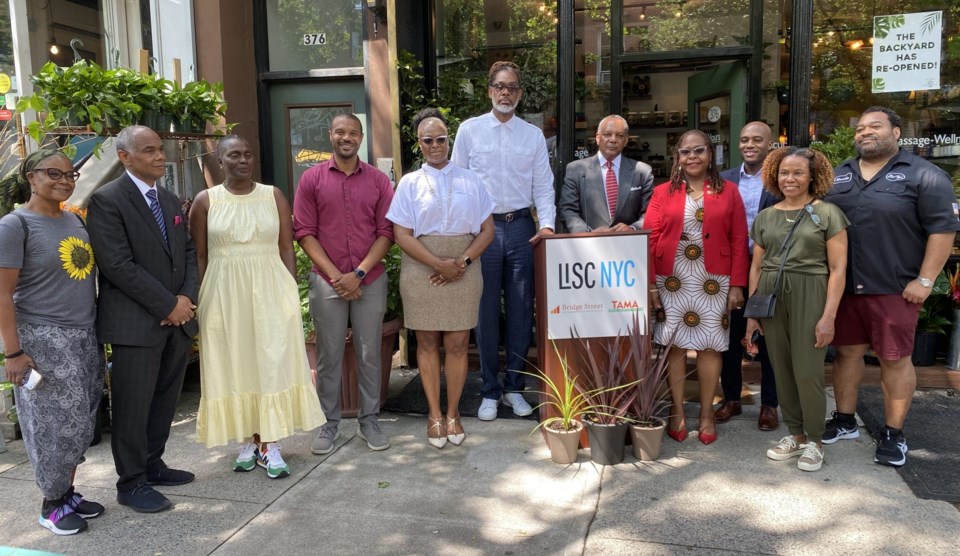A small crowd gathered Tuesday outside Life Wellness Center on Tompkins Avenue in Bed-Stuy to advocate for post-pandemic financial relief for minority-owned small businesses in the city.
Business owners, community organizers and elected officials came together to highlight the dire situation many minority-owned small businesses in Brooklyn are facing after the pandemic, and the importance of supporting those businesses to thrive in our community.
"These businesses serve as the economic, cultural, and social backbone of countless neighborhoods across the five boroughs, and, too often, serve as the only link to entrepreneurship, opportunity, and employment for many of the city's Black and Latino communities," Valerie White, executive director of Local Initiatives Support Corporation NYC, said.
"Many of these minority-owned businesses are also micro-businesses with three or less employees and simply cannot afford time away from running their operation."
The event was hosted by LISC NYC, which supports the equitable development of historically disadvantaged communities in New York City. A recent survey by the group found that nearly three quarters of minority-owned small businesses in New York City fear they will soon close if they do not receive immediate financial relief.
Representatives from other community organizations, including the Bridge Street Development Corporation and the Tompkins Avenue Merchant Association, also spoke at the event, stressing the numerous obstacles minority-owned businesses face in the city.
"Long before the COVID-19 pandemic, minority-owned small businesses had to overcome institutional inequities and systemic biases that made everyday operations that much more challenging," Gregory Anderson, CEO and president of Bridge Street Development Corporation, said.
Assemblymember Stefani Zinerman, State Senator Jabari Brisport and City Councilmember Robert E. Cornegy, Jr. were among the elected officials that spoke at the event.
Zinerman gave an impassioned speech, detailing the history and significance of minority-owned businesses in Bed-Stuy. "We have a legacy of entrepreneurship in this neighborhood that cannot be denied. African Americans from the Caribbean and from the south came to Bedford Stuyvesant and invested in property and invested in businesses," Zinerman said.
Brisport and Cornegy highlighted some of the work the government had already done to offer help to small businesses, but made it clear there is more was needed.
Brisport added the dire warning that if we didn't fight to keep out local businesses open, we would lose the "vibrant, thriving community that we've had here."
"We have to make sure that our local community storefronts stay open, because if we don't we know what is going to move in and it's going to be Starbucks, it's going to be Duane Reade."
Khadija Tudor, the owner of Life Wellness Center which received a grant from LISC NYC amidst the pandemic, told the crowd that although Black and Brown business owners were not in the minority in spirit, they definitely were in numbers.
"The idea of being able to open a business, in a time even before COVID, for my family meant using our own resources, it meant using not loans, but savings," she said.
"When COVID happened, it showed us that not only do we need to learn how to be sustainable, but we needed help to be sustainable. Most small businesses in America, it's really what keeps neighborhoods alive."
BK Reader's Publisher C. Zawadi Morris also received a LISC NYC grant during the pandemic, and said it was what kept the local news publication running.
"When the pandemic first hit, we actually considered shuttering our organization because most of our revenue was generated from advertising dollars," Morris said.
"These types of organizations were absolutely essential in keeping us going and actually helping to boost 2021."




